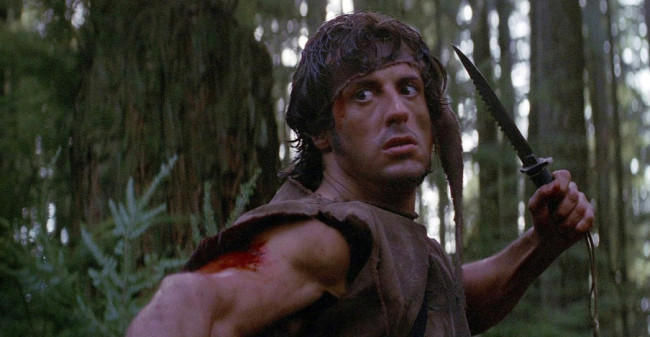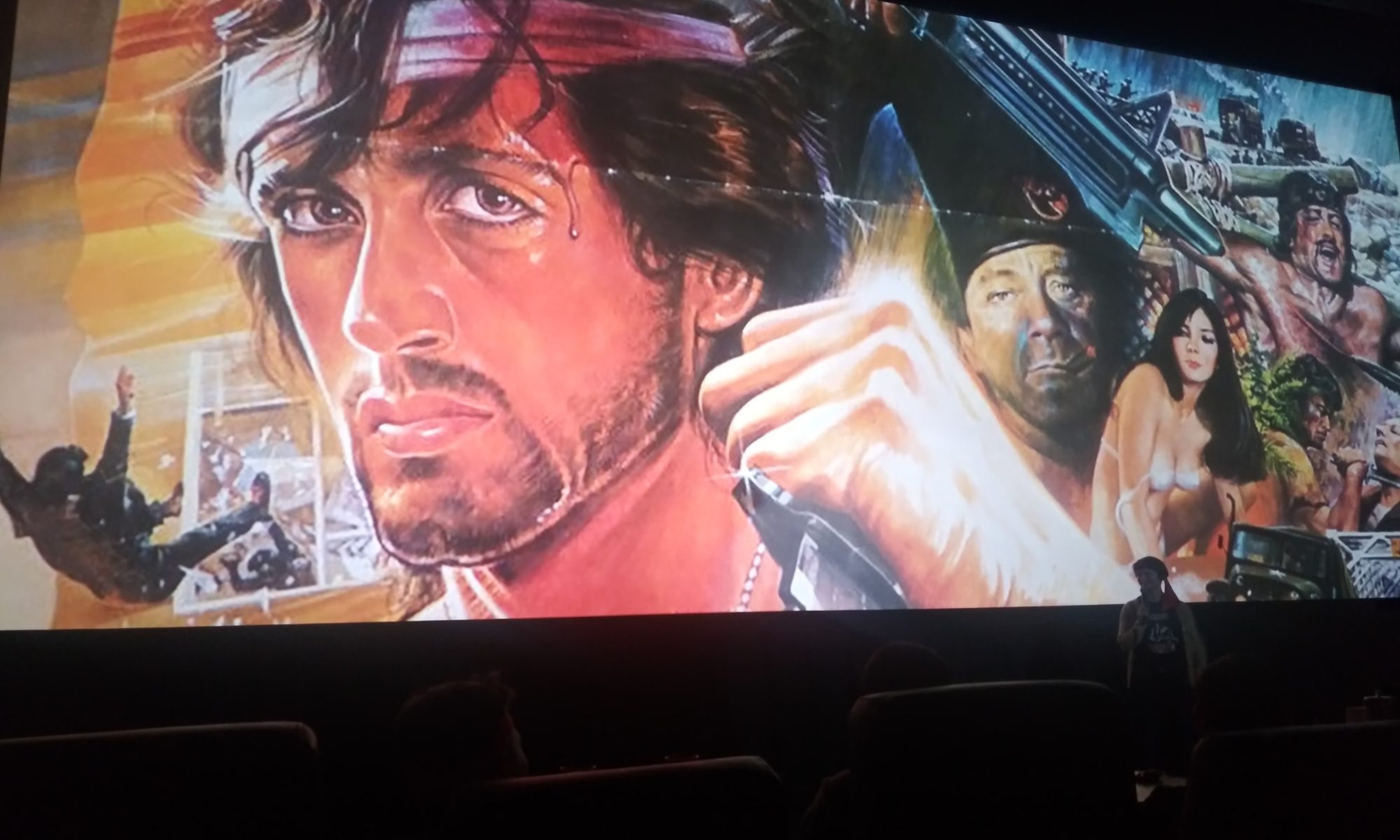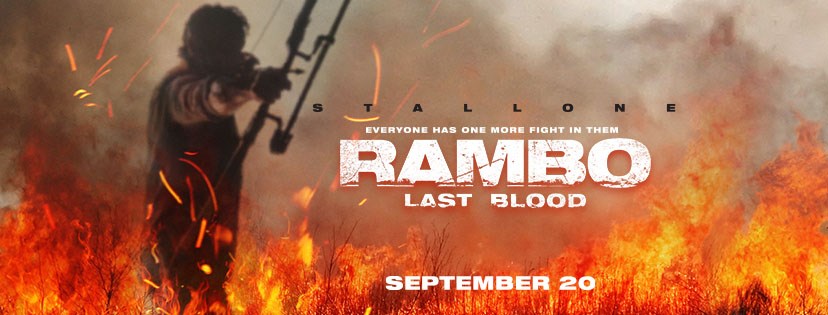
Nearly forty years after First Blood — based on the book of the same name by David Morrell — was released, star Sylvester Stallone has returned for the ostensible final story in the life of one, John Rambo, in director Adrian Grunberg‘s Rambo: Last Blood. To celebrate the return of the seminal (yet, also, most unlikely) 1980’s action badass, the Alamo Drafthouse Cinema, out here in Brooklyn, hosted a marathon screening of every single Rambo film. And you BETTER believe I was there for the whole damn thing. You can skip ahead to the review of Last Blood at the bottom of this page…but the context really is king for this series, and I didn’t sit through 9 Goddamned hours for you to NOT read this whole thing. So let’s start with a brief roundup leading up to the latest entry…
FIRST BLOOD (1982)
The adaptation of David Morrell’s novel finds Vietnam veteran John Rambo wandering the Pacific Northwest in search of Delmore Barry, the last of his comrades from his battalion. Delmore’s dead, he’s told, struck down by cancer from Agent Orange. And now, alone and without purpose, Rambo drifts on, finding himself in Hope, Oregon, and in the path of Sheriff Teasle (Brian Dennehey), who sees nothing more in Rambo than some drifter riffraff. In trying to push Rambo out of Hope, Teasle pushes a bit too far; Rambo snaps, escapes into the woods, where he’s in his element, and comes thisclose to offing the entire police force (accidentally killing one of the deputies…the film’s only casualty), before Col. Trautman (Richard Crenna) flies in to bring Rambo in.

This was the unlikely introduction to what would be one of the most masculine and jingoistic of 1980’s American film heroes, and a blatant symbol of American jingoism, which is an odd connection logically. Here, Rambo is not only opposed to authority (apart from Trautman), but is initially opposed to violence, resorting to it only as an absolute last resort, and pushing only so far as to show how easily he could wipe out Teasle and his men. His explosive outburst at the police station that sets the plot in motion is a nearly-subconscious reaction: his PTSD triggering his survival instinct to the point where only the man who trained him can (to an extent) deprogram him enough for him to be brought in peacefully.

I’d seen this film dozens of times before, but there’s something so vulnerably sad about Stallone’s performance on a big screen, delivering his rambling, cathartic, and ultimately sombre monologue at the end, as a broken man, reaching out for this one father figure he has left, and seeing the little tics on Trautman’s face, listening, perhaps for the first time, at what his training has wrought and the life it ultimately destroyed, and the silence of the theatergoers around me. There is a power in that performance that is lost somewhat seeing it on the small screen…
4.75/5 bibles
RAMBO: FIRST BLOOD PART II (1985)
…but FUCK THAT introspective shit! It’s time for Rambo to go back to ‘Nam, on the orders of Trautman and head duplicitous douchbag Marshall Murdock (Charles Napier) on a sham recon mission to find a POW camp where long-long Vietnam vets were believed to still be held. This story, directed by George P. Cosmatos (yes…the father of Mandy director Panos Cosmatos), and written by James Cameron (and Stallone) is lean, and really pulls no punches, nor hides any secrets. Rambo forsakes his mission to merely photograph the existence of the POWs to instead stage a rescue, and along with Co Bao (Julia Nickson), steals a damn helicopter, explodes hundreds of Vietnamese and Russian no-names, and gets them the hell out of dodge.

While Rambo is no longer the wiry, forlorn, withdrawn person he was in First Blood, he is just as monosyllabic and anti-authoritarian. The transformation makes some sort sense given that we first see him having spent years breaking rocks in a quarry, while serving a sentence for the madness in Hope, and once he’s on the ground, it’s like getting back onto a well-loved bike. His transformation into a symbol of 1980s American dominance is perplexing, given here he is operating essentially on his own, opposed to the ruses and duplicities of the military apparatus that brought him back to the country that tortured him, again fighting for what is ultimately a giant lie.

And here his most dominant trait is clear: he doesn’t fight for flag, or country, or under orders, but he fights to right a wrong done to others: in First Blood, done to the veterans sick, forgotten, and unable to adapt to civilian life; here, to the veterans literally forgotten and swept under a rug. His explosive demolition of Murdock’s high-tech base might as well be aimed at the Pentagon, for all the subtext it holds.
3.5/5 bibles
RAMBO III (1988)
Fuck the titling system of this series! Rambo’s out now stick fighting in Thailand, donating the proceeds to (and working at) a Buddhist monastery, when Trautman tracks him down to help covertly supply weapons to Afghan rebels fighting the invading Russians. The deal goes pear-shaped, Trautman gets captured, and Rambo’s gotta get in and get Trautman out from the clutches of the sadistic Russian Col. Zaysen (Marc de Jonge). This is often considered the nadir of the series (or was the nadir until recently…), but here there’s a bit of an inversion of Rambo’s character: in every iteration he’s searching for some figure on which to latch onto, for either protection (Trautman), or for some sort of companionship (Co Bao).

“Shut up, John.”
Here, Rambo is that person to both Trautman, who realizes perhaps he’s too old for this shit, and Hamid (Doudi Shoua), a young Afghan boy who fights alongside Rambo against the Russians (and isn’t as annoying as I had remembered him being…plus any movie that has the balls to shoot a kid in the leg is fine by me!). Sure, it hasn’t aged well (it and The Living Daylights are…interesting…watches in famous series these days), and the climactic battle is rather repetitive and technically inept (Rambo drives, reloads, aims, and fires a tank?), but it isn’t the offense most remember it being.

But this Rambo is almost entirely different from even the First Blood: Part II iteration: a smorgasbord of muscles and testosterone who becomes a parody of himself in action, if not necessarily motivation, simply due to how utterly unstoppable he is, hole in kidney or no hole in kidney. And somewhere along the way he even gained a sense of humor! Go figure! Politics aside, this is a meat-headed, yet ultimately harmless entry.
2/5 bibles
RAMBO (2008)
Ahhhhhhh…2008’s Rambo. Hot DAMN I love this movie more than it is legal to do so. This movie should not have worked as well as it did, but here it is, a damned classic of the genre, and an absolute perfect character analysis (so much so that David Morrell turned down novelizing it, arguing that the film got Rambo’s character mostly right enough to not need further details or correction via a book). A two-act film in which Rambo, living near the border of Burma as a snake wrangler and river guide, is tasked with leading a group of humanitarians (led by Paul Schulze‘s Michael Burnett and Julie Benz‘s Sarah Miller) up the river to a village of persecuted Karen tribespeople, who have been singled out for extermination by the Burmese military dictatorship. They’re kidnapped by the junta, their church hires mercenaries to retrieve them, Rambo leads the mercenaries up to their last location (and ultimately helps them out, and Rambo finds something new worth fighting for, and a new reason to return home.

It is as simple as can be, absolutely no fat whatsoever; yet even then, the supporting characters are fleshed out enough to be individual (especially the mercenaries, led by Gavin McTavish, despite their limited screen time), and the brutality in the violence is a natural progression from the excess of the prior two sequels: explosively visceral to watch, yet with a weight that shows the actual effect of the type of warfare. This film isn’t “fun” to watch per se, but there is a thrill in watching Rambo lay waste to hoardes of genocidal juntas from the back of a truck. And an aged Rambo fighting, in the background, via a truck-mounted M2 Browning, alongside a group of mercenaries makes logical sense…he isn’t running as a one-man army while pushing 60 years old.

And, for a time at least, we are content with Rambo returning home to Bowie, Arizona, at the end of the film, walking up to a homestead bearing his family name, just as unsure of his future as when we first met him in 1982.
4/5 bibles
RAMBO: LAST BLOOD (2019)
This. FUCKING. Movie. I If I had paid to see this film in theaters on its own, without a marathon of the previous films preceding it, I would have left much more livid and much more drunk than I was. This movie is abysmally, and disappointingly, bad. Here, it’s 11 years after the events of Rambo, and Rambo’s been spending his latter years working his family homestead with old family friend Maria Beltran (Adriana Barraza) and her granddaughter, Gabriela (Yvette Monreal), who calls Rambo “Uncle John”. Gabriela has found her deadbeat father through her friend, Gizelle (Fenessa Pineda), who leads her to Mexico, where Gabriela is subsequently (and really REALLY quickly) drugged, kidnapped, and sold into slavery. Rambo goes across the border to get her back, and yada yada yada.

I’d summarize the rest of the plot, but none of it mattered. This is a lazy, lazy film, with a central character barely recognizable from any of his previous iterations (especially his prior appearance in 2008). This John Rambo in Rambo: Last Blood is the exact same character as John McClane in A Good Day To Die Hard: nothing but a recognizable actor playing the original role in name only. This is “John Rambo” the same as people in the comments section right now are named “Anonymous”. There is nothing interesting or remotely human about him (especially once the insane, fever dream, Saw-inspired, and completely unhinged final battle starts up). Stallone — one of my genuinely favorite actors and role models (ask me about that some day!) — could not be less interesting in this, possibly his least captivating version of the character, and one of his laziest late-era roles.

There’s a disappointing laziness that permeates the entire film: Rambo has spent years digging intricate tunnels on his property (I wonder where the climax is going to be set?!)…for some reason. He, a man who has begrudgingly turned to violence as the absolute last resort while hating every second of doing so despite being exceptionally good at it…collects every type of weapon imaginable. For some reason. He suddenly has a close, old family friend…who has never, ever been mentioned once, even when he is straight-up asked in the previous film if he has anyone to love, and he says, noncommittally, “I dunno. Father, maybe.” His physicality is lost: he is no longer the hulking beast he was in the last film, which makes a BIT of sense…but in losing his physical presence, he is prone to saying how he feels and what he’s thinks, as opposed to showing it.
Never is this more apparent than in a scene in which he and Gabriela are riding horses and talking about their relationship, and what they mean to each other. We don’t see their bond, so we can’t feel it, so there’s no drama to what happens in the second act. It feels almost as if Stallone walked onto set wearing whatever he came to work in, and they kept the first take he performed after reading the script for the first time.

We’ve never seen these family friend characters before, never even had them mentioned ever, and the catch-up to make us, the audience, care about them, is too much to show…so they just say it. Paz Vega as journalist Carmen Delgado, who just HAPPENS to be investigating the Martinez Brothers and their gang (who have kidnapped Gabriela) acts, sadly, merely as an exposition dump, and even when Rambo asks for her help, we are never shown (or told) whether she actually does help him…so what’s her point?
It would have been interesting to see her actually DO something to impact the plot, but she doesn’t. Even the humanitarians in 2008’s Rambo finally threw down when they were getting desperate, which mattered to the characters and the theme of that film since they were Christian pacifists: even THEY had their limits.

In Rambo, the villain, Maj. Tint (Maung Maung Khin) never even encounters Rambo until the last second of his life, yet we know enough about him in his screentime to hate him and his sadism.
Here, the Martinez Brothers, Victor (Óscar Jaenada) and Hugo (Sergio Peris-Mencheta)…names that would be good puns if they were actually French…are scary and despicable because Carmen tells Rambo that they are so: we’ve seen far worse from the lesser villains and henchmen in the series’ earlier installments.

Rather than the villains being exemplars of evil, here it is the ENTIRE COUNTRY OF MEXICO that is a deadly threat: as soon as Gabriela drives south of the border, she is sized up, stalked, and eyed by guys wearing wife-beaters, and openly drinking 40s and packing heat, and gets drugged within MINUTES of going to a Mexican club. There were so many establishing shots of the border wall I was waiting for a “Endorsed by the Office of POTUS” watermark to appear and bald eagles to fly over.
Rambo and Maria seem more terrified of Gabriela going to Mexico as a mere concept than going to meet her shitty father; and Gizelle, in particular, looked like she walked out an early-1990s anti-gang PSA, wearing her plaid shirt with only the top button buttoned. Jesus wept.

But gross politics aside…Rambo just isn’t Rambo here. When the bonkers third act begins, he relishes violence to an almost manic, sadistic degree; and while it could be argued that he is merely putting his military training to use, and this is a personal battle, there is a sophistication to what traps he sets that belies a patience and planning, an anticipation and longing for what he is about to do, for whatever reason.
(I’m reminded of a line from Garth Ennis‘s Punisher run, where Micro confronts Frank: “You’re not crazy. If you were you’d have walked into a McDonald’s with a grenade. You don’t take pleasure in what you do. Don’t take pleasure in anything, really, from what I can tell.” Here, Rambo IS the crazy person Micro is describing who enjoys the violence he inflicts.)

His last, final violent act in the movie is so LEAGUES removed from anything the scared, taut, awkward guy asking for a buddy’s address in the Pacific Northwest that it might as well be…nay…IS…nay…HAS TO BE…a completely different character. It HAS to be. His hair is completely different: cut short and neat. He talks calmly and normally to people.
Presumably he’s absorbed into society and paying taxes to the authorities and government from which he’d been running his entire adult life. He has eschewed all the tokens he used to wear in remembrance of the people for whom he cared (his buddy’s black bandanna; Co’s Buddha and red dress strip; Sarah’s crucifix). His survival knife is gone. He gets his military jacket back…Hell, even the scar on the left side of his face…the one he’s worn for THE PAST THREE MOVIES!…is magically gone!

Wait. I’ve figured it out: someone MURDERED John Rambo and assumed his identity. Someone with equal military skills, training, and an excessive bloodlust; a wounded and tortured Vietnam vet with no family, and with the physicality and drive to pursue evil brown people and literally and graphically cut out their hearts. Last Blood isn’t the (presumably) final Rambo movie: it’s a blunt introduction to a hard-R Punisher film series!
Look, I am a HUGE fan of these movies (to wit: I paid nearly $40 to sit, by myself, for over 9 hours to see 4 movies I OWN, and one I’d never seen before, on a SUNDAY, where I left the theater more alcohol than man at 10pm to go to work the next day. Don’t call me a non-fan): Last Blood is not for “the fans”. That’s a cop out excuse for a poor film. I don’t mind shady politics, or political incorrectness or ultraviolence or any of the other excuses people are giving for the poor reviews: I mind lazy and boring stories that aren’t engaging.
So long as the story and characters are compelling, I’ll follow any sort of otherwise “distasteful” content you can throw at me…but it has to mean something, or at least be fresh and interesting. Characters are just plot contrivances, and if the film had focused, perhaps, on Rambo navigating his way through a cartel, on their own turf and with minimal resources — as opposed to setting traps and just waiting for all the bad guys to come to him to be dispatched with relative ease — it would have been more exciting.
2008’s Rambo succeeded in using Rambo’s age against him: he had to rely on the other mercenaries, and use whatever was at his disposal at the moment, with tension building since the middle section is in enemy territory, on their own base; hell, his use of the M2 Browning at the end was pure Rambo: the quickest, most efficient way to go through waves of enemies, while relishing not one single second of it. There’s a bizarre sadism to Rambo in Last Blood that became a tad uncomfortable by the time the credits rolled.

Rambo had come full circle in as tasteful fashion as he could back in 2008: digging him out and turning him into whoever he is in this film leaves a sad, gross, worn taste in the mouth. Last Blood loses the fun, adventure, visceral thrills, subtext (yes, subtext! You most definitely can analyze and over-analyze and contextualize Rambo), and soul of the prior installments. I don’t know where Rambo can go from here, but I sincerely hope it’s back to the drawing board, because as much as it tries and wishes to be, Logan this ain’t. 1/5 Fucking SEVERED HEADS?!
Rambo: Last Blood is currently playing in theaters if you wish to punish yourself for what only you know you’ve done.
Alamo Drafthouse Brooklyn Rambo Marathon final score: 3/5 Bibles.
-J.L. Caraballo






